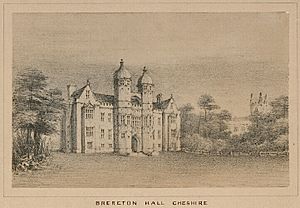William Brereton, 3rd Baron Brereton facts for kids
William Brereton, the 3rd Baron Brereton (born May 4, 1631 – died March 17, 1680), was a smart English person who loved mathematics and was also a politician. He was a member of the House of Commons, which is like a big meeting place where important decisions about the country were made. He became a Baron, a special title in Ireland, in 1664.
William Brereton was also the head of a group called the Committee of Accounts, often known as the Brooke House Committee, from 1667 to 1670. This committee looked into how the government was spending money. During this time, he had many disagreements with a famous writer named Samuel Pepys. Pepys wrote about Brereton in his diary, and even though Pepys might have been a bit unfair, his writings give us the best idea of what Brereton was like.
Contents
Early Life and Studies
William Brereton was the oldest son of William Brereton, who was the 2nd Baron Brereton. His family lived at a place called Brereton Hall, which was near a city called Chester. His mother was Lady Elizabeth Goring.
When he was younger, William Brereton went to a school called the Orange College of Breda. There, he studied mathematics and Greek. He had a special teacher named John Pell, who was also a mathematician.
Becoming a Politician
In 1659, William Brereton was chosen to be a Member of Parliament for a place called Newton. This meant he was elected to represent the people in the Third Protectorate Parliament. The next year, in 1660, he was also elected for another area called Bossiney. He later said that he didn't have much special influence with the King or at the royal court.
In 1663, William Brereton became one of the first members of the Royal Society. This is a very old and respected group of scientists and thinkers. When his father passed away in 1664, William inherited the title of Baron Brereton. In 1668, he helped another mathematician named Thomas Branker by giving him a church position in a town called Tilston.
Leading the Brooke House Committee
William Brereton became quite important for a short time when he was the head of the Brooke House Committee. This committee was officially called the Committee of Accounts. The House of Commons set it up to find out why the Navy had problems during the Second Anglo-Dutch War.
Brereton himself said he was chosen because he wasn't seen as someone who was easily influenced by the King or powerful people. This made him seem fair and independent. He had a very strong opponent in Samuel Pepys, who was excellent at defending the Navy's actions.
Arguments with Samuel Pepys
Pepys wrote about Brereton in his diary, and his description might not have been completely fair. Some historians later used Pepys' words to describe Brereton as a "fat old Cheshire magistrate." But actually, Brereton lived in London and was only in his late 30s, just like Pepys.
However, Pepys was known for being very accurate in his reports. So, his descriptions of their frequent, heated arguments are probably true. For example, Brereton once got angry and told Pepys off for questioning how the committee understood a law. Pepys famously replied that any English person could read a public law and decide what it meant for themselves.
When Brereton then asked sarcastically if Pepys would go against the whole world, Pepys bravely said he would "defy the whole world and Lord Brereton in particular!"
Royal Support for Pepys
It was harder for Brereton because King Charles II and his brother James, Duke of York (who later became King James II) were often present at the hearings. They clearly showed their support for Pepys. One time, James even told Brereton off for using improper language.
Another time, Brereton said he had written proof that Pepys had taken a bribe. But the King calmly asked if anyone could believe that Pepys would take such a small amount of money.
After a while, the committee was closed down. It didn't really achieve any lasting results. After this, William Brereton mostly stopped being involved in public life.
Family Life
William Brereton married a woman named Frances. She was the daughter of Francis Willoughby, 5th Baron Willoughby of Parham.
William Brereton passed away in 1680 when he was only 48 years old. His sons, John and Francis, took over his title. When Francis died in 1722, there were no more people to inherit the title, so it ended.
 | Laphonza Butler |
 | Daisy Bates |
 | Elizabeth Piper Ensley |


